
Three Questions with Michael and Nichole Ritchie
Michael Ritchie, a financial analyst at the Texas Military Department and current Texas State Guard officer is a descendant of multiple U.S. and Texas Revolutionary soldiers. Nichole Ritchie, a Texas history teacher, has devoted all of her free time to the preservation and sharing of local Texas history. Besides the Portal, they have worked on projects with the Sons and Daughters of the Republic of Texas, the Former Texas Rangers Association, the Texas Military Forces Museum, and are current members of the Burnet County Historical Commission. Three Questions is an initiative to share the value that our faculty, students, and external patrons derive from using the Portal to Texas History at UNT Libraries. 1. How important is hosting your historic materials on UNT’s Portal to Texas History? The Private Collection of the Ritchie Family that Nichole and I have worked to get onto the Portal is important, not for ourselves, but for the larger community of Texans that otherwise would never have access. 95% of the materials we’ve submitted to the Portal are period military records of Texans that served in WWII. For several generations, these records have almost totally been lost as a result of the 1973 St. Louis Archives fire that destroyed 80% of all U.S. Army and Army Air Force records from WWI and WII. Our ability to have our county service books digitized on the Portal is vital as they serve as the only period military record of tens of thousands of men and women that served. The Private Collection of the Ritchie Family is centered around military records pertaining to Texans during World War II. A majority of the collection is made up of county service books dating to 1946-1947 that document the WWII military service of men and women from the individual counties of Texas. 2. Can you tell us a story or two about how patrons or visitors have used your online collections that are hosted in the Portal? From individuals and organizations that have reached out to us, we have been able to share photographs and service information to many families and genealogists that were unable to locate and document their family’s service from the federal government. On top of that, we have been able to provide information to other organizations for inclusion such as the City of Austin’s To Serve virtual exhibit that showcases the stories of veterans that are buried in the City of Austin’s many cemeteries. 3. What do you want others to know about your experience partnering with UNT’s Portal to Texas History? From the very beginning is has been an easy process with the Portal. All of the staff have been very helpful walking us through the process of how everything works, we were even able to get a tour of the digital lab one year. The biggest thing I would impart on anyone thinking about working with the Portal is to simply do it. So much of history is lost simply because people don’t know what resources are out there to save it. Luckily the Portal makes it incredibly easy for those with an interest in Texas history to make sure that important documents, photos, and artifacts can be saved and preserved for posterity. Michael Ritchie, a financial analyst at the Texas Military Department and current Texas State Guard officer is a descendant of multiple U.S. and Texas Revolutionary soldiers. Nichole Ritchie, a Texas history teacher, has devoted all of her free time to the preservation and sharing of local Texas history. Besides the Portal, they have worked on projects with the Sons and Daughters of the Republic of Texas, the Former Texas Rangers Association, the Texas Military Forces Museum, and are current members of the Burnet County Historical Commission. external_relations_in_the_news_three_questions
Posted:
12/07/2023
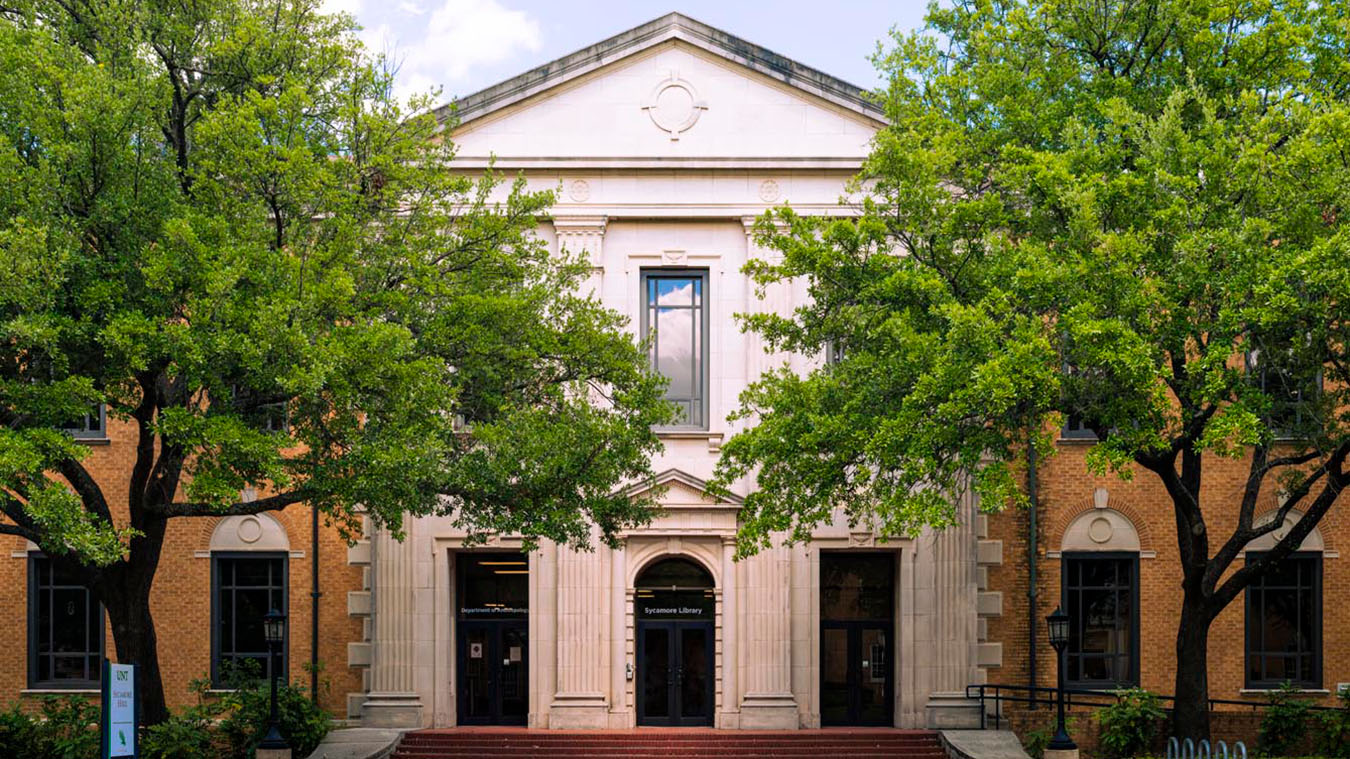
Sycamore Library Closing for Renovations
Sycamore Library will be closed for renovations from December 1 – early March. Purpose Sycamore Library will be closed for renovations from December 1 – early March. During this time, most frequently used and newly requested course reserves for Geography, Public Administration, Emergency Management and Disaster Science, Political Science, and College of Business will be available at the Willis Library services desk. Sycamore Library circulating collection materials may be requested for pickup at other library locations or office delivery via Online Holds. Research assistance is available via askus@unt.edu or govinfo@unt.edu, by phone, and in person by appointment. public_services_in_the_news
Posted:
11/17/2023
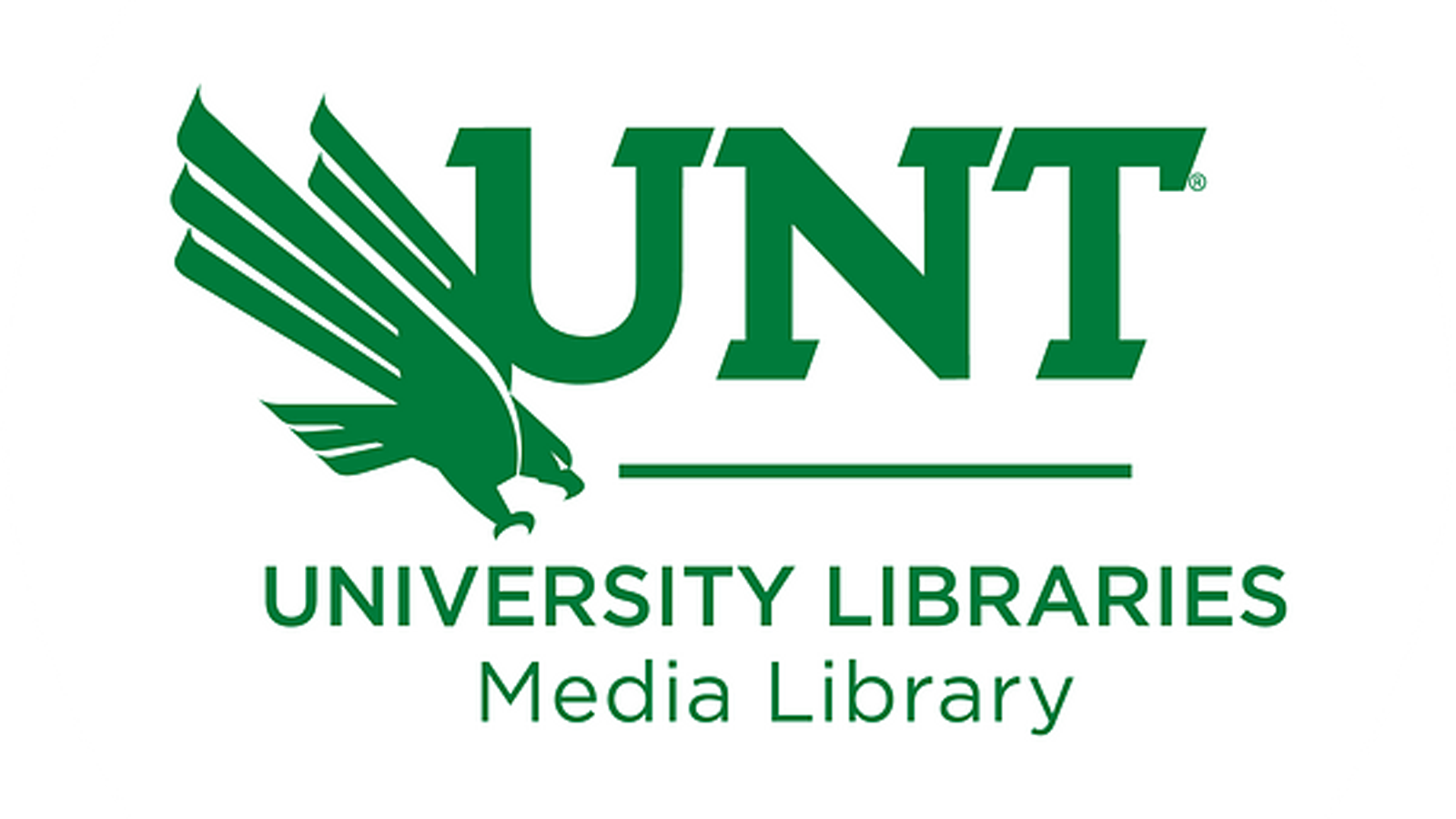
The Media Library Is Moving to Willis!
The Media Library is moving to its new home on the second floor of Willis Library! The Media Library is moving to its new home on the second floor of Willis Library! We will officially close our doors in Chilton Hall at Noon on Friday, December 8th with limited services resuming in Willis on Tuesday, January 2nd. During this time, Media Library services such as checking out materials, holds, bookings, course reserves, and reservations will be paused. UNT faculty, staff, and students are encouraged to make their media requests by Wednesday, December 6th to avoid processing delays and to email media.library@unt.edu if they have any questions or concerns. The new Media Library and Media Services desk will reopen in Willis when the spring semester begins on Tuesday, January 16th. public_services_in_the_news
Posted:
11/15/2023
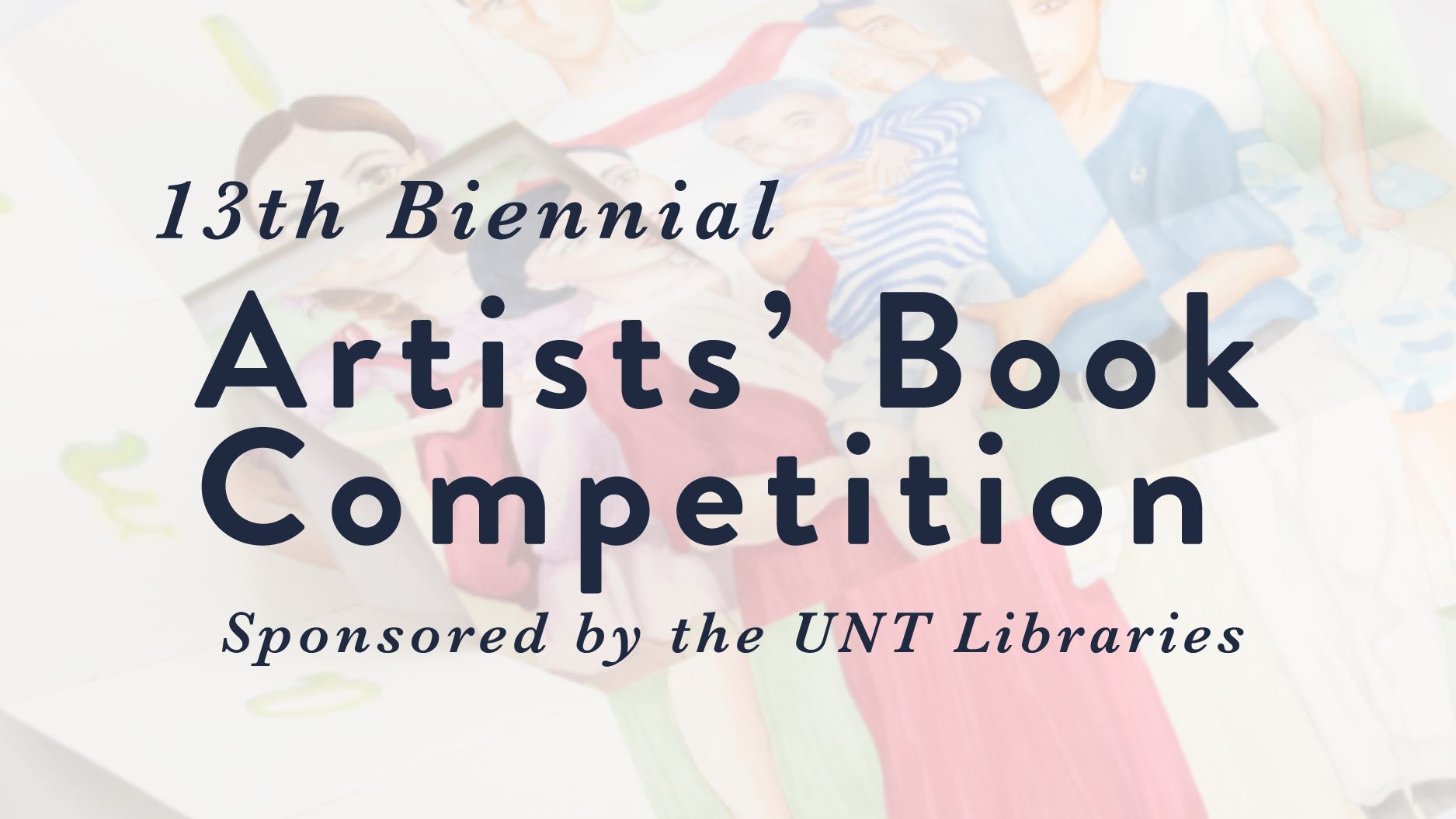
13th Biennial Artists' Book Competition Call for Entries
The purposes of the competition and symposium are: to encourage the development of students’ work in the medium of Artists’ Books, to foster the creation of Artists’ Books, to reward excellence and creativity in the Artists’ Books, and to build the collection of Artists’ Books in the UNT Libraries’ Special Collections. Purpose The purposes of the competition and symposium are: to encourage the development of students’ work in the medium of Artists’ Books, to foster the creation of Artists’ Books, to reward excellence and creativity in the Artists’ Books, and to build the collection of Artists’ Books in the UNT Libraries’ Special Collections. Entries will be accepted in two categories: a Student Purchase Prize category and a Non-Student category. One winner will be selected from each category, but the $400 purchase award will only be given to the winner of the student category. Honorable mention awards will be given in each category at the discretion of the jurors. Additional entries from both categories may be selected for purchase dependent upon availability and budget restrictions of UNT Special Collections. For the first time ever, the competition will conclude with a one-day book arts symposium to be hosted by UNT Special Collections, and held within Willis Library on Saturday, March 23, 2024. This symposium will feature a pop- up display of entries, along with a reception to honor the purchase prize winner and honorable mentions of this year’s competition, and other opportunities for students and others to connect with, explore, and celebrate the field of book arts. More information will be available about symposium events and the schedule in early 2024. Student Purchase Prize Category. All eligible entries in the Student Purchase Prize category must be available for purchase into UNT Special Collections for $400. The item chosen for the purchase prize will become a permanent addition to the Artists’ Book Collection in UNT Special Collections, and will be highlighted at the UNT Special Collection’s Book Arts Symposium to be held on March 23, 2024. Non-Student Category Although entries in this category are not eligible to win the purchase award, the competition is open to alumni, faculty and staff of the University of North Texas and members of the local community. If you would like to enter up to three items in the competition, you are highly encouraged to do so. Even though the items are not eligible for the prize, if accepted, they will be shown at the UNT Special Collection’s Book Arts Symposium on March 23, 2024, which will give the work exposure to the campus and community. Eligibility Requirements Any Artists’ Book created within the last two years is eligible. All media are welcome. Books of all shapes and sizes are welcome. Entries that are not able to be displayed securely during the symposium will have photographs of the item displayed in lieu of the actual entry. Entries meeting eligibility requirements will be displayed during the UNT Special Collection’s Book Arts Symposium on March 23, 2024, along with a reception to honor the purchase prize winner and honorable mentions. A maximum of three books may be submitted. There is no jury fee. Entry Procedure A completed entry form (type or print legibly), identification labels attached to individual works, and SASE for return of entries if being mailed must be included with the artwork. Works will be accepted December 4-8, 2023. All communications with participants will be through email, unless participant indicates other preferred method. Deadline: Friday, December 8, 2023 by 4:00pm. Artists are encouraged to hand-deliver work to Willis Library, Special Collections, Room 437, UNT, between 9am and 4pm Monday, and Wednesday-Friday. Special arrangements can be requested to deliver items on Tuesday by contacting specialcollections@unt.edu. Work may be shipped in a reusable container prepaid via UPS, Parcel Post, or FedEx. It is the artist’s responsibility to include return shipping (please do NOT enclose checks or cash). Ship work(s) to: UNT Libraries Artists’ Book Competition Attn: Meagan May University of North Texas Willis Library 1155 Union Circle #305190 Denton, Texas 76203 Return of Work All hand-delivered work not accepted for display during the symposium must be picked up from Special Collections (Room 437) in Willis Library, January 22 - February 2, 2024 between 9am and 4pm Monday, and Wednesday - Friday. Special arrangements can be requested to pick up entries on Tuesday by contacting specialcollections@unt.edu. All shipped works not accepted will be returned in original packing material by February 2, 2024. Any shipped works that do not include return shipping must be picked up no later than February 2, 2024 by 4pm. Liability All reasonable precautions will be taken to ensure protection of the work while in the care of the UNT Libraries. However, no liability will be assumed by the University of North Texas, its staff, faculty, or students for loss or damage to any work submitted for any reason before, during, or after the competition and symposium. Insurance is the responsibility of the artist. Calendar December 4 – 8, 2023 Delivery of work from artist to Willis Library, Special Collections (Room 437) January 12, 2024 Jurors’ selections completed January 19, 2024 Notifications made January 22 – February 2, 2024 Works not accepted for symposium display will be returned or picked up March 23, 2024 Works are displayed during the Special Collection’s Book Arts Symposium April 1 - 12, 2024 All exhibition works picked up or shipped to artist by this date Each entry must have a legible entry form with name and contact information.If return postage is not included, works may be picked up in person in Willis Library. UNT Libraries is not responsible for works not picked up by April 14, 2024. special_collections_in_the_news
Posted:
11/09/2023
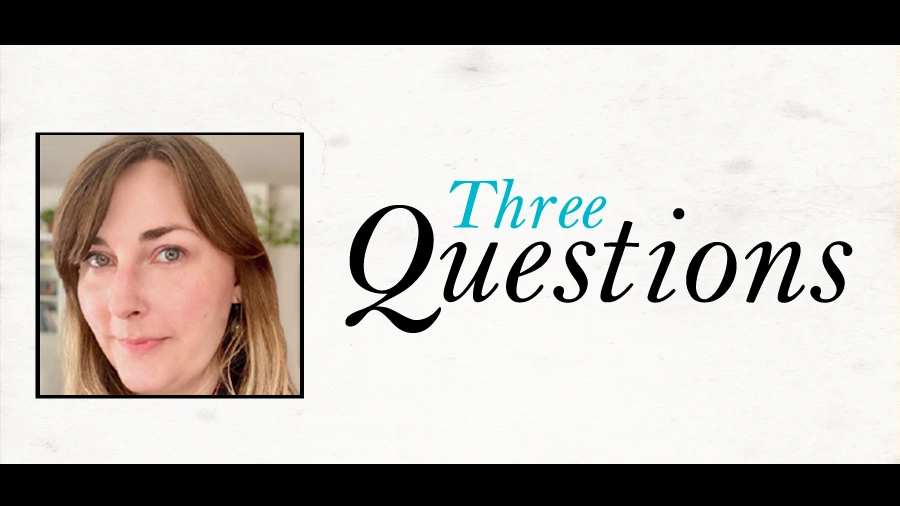
Three Questions with Ashley Williams
Ashley Williams is a PhD candidate at Columbia University who specializes in the art and material culture of the United States. She has assisted with projects at the Wallach Art Gallery, the Bard Graduate Center Gallery, Historic Deerfield, the Newport Restoration Foundation, and the Blanton Museum of Art. From 2018 to 2019, Ashley was the John Wilmerding Intern in American Art at the National Gallery of Art. She holds a BA from Agnes Scott College and an MA from the University of Massachusetts-Amherst. She is the 2023-2024 William H. Truettner Fellow at the Smithsonian American Art Museum. Three Questions is an initiative to share the value that our faculty, students, and external patrons derive from using the Portal to Texas History at UNT Libraries. 1. How important is the Portal in your teaching, learning or research? The Portal has become essential to my research on Black experiences of enslavement in Texas. My research has expanded greatly from this rich archive of maps, newspapers, photographs, and 19th century publications. The newspapers have been especially amazing. I was able to save dozens of hours by doing keyword searches in digitized issues, rather than scanning archival copies by eye. The ability to read through such a breadth of local news and op-eds immersed me in the happenings of Guadalupe County. Because these newspapers were written by and for white audiences (often with investment in slavery), such broad reading also taught me how to read between the lines to glean information about enslaved life and patterns of self-emancipation specific to Central Texas. The collection of maps has also been particularly helpful for tracing land ownership of enslavers over time—and thus, for getting a better understanding of the locations and conditions that the enslaved potters I focus on were inhabiting. 2. How has the Portal changed the way you approach your research, teaching or learning? The Portal is now the first place I go when I have a new research query around Texas history. I can certainly see using the Portal in future classroom assignments to help students engage directly with primary sources. 3. What do you want others to know about your research, teaching or learning? My dissertation provides the first comparative analysis of unfree artistic labor in the U.S. I examine objects from the shifting borders of U.S. empire, including stoneware vessels made by enslaved potters in Texas, ledger drawings made by Kiowa and Cheyenne prisoners of war from Indian Territory, and wicker chairs made by incarcerated weavers in the Philippines. The Portal has been integral to work on my first chapter, which explores the story of enslaved potters Hiram, James, and Wallace Wilson in Guadalupe County. After Emancipation, the potters founded their own successful H. Wilson & Company pottery: the first Black-owned business in Texas. Today, in large part due to the advocacy of descendants, the story of these potters is known, and their vessels are widely collected and celebrated. Ashley Williams is a PhD candidate at Columbia University who specializes in the art and material culture of the United States. She has assisted with projects at the Wallach Art Gallery, the Bard Graduate Center Gallery, Historic Deerfield, the Newport Restoration Foundation, and the Blanton Museum of Art. From 2018 to 2019, Ashley was the John Wilmerding Intern in American Art at the National Gallery of Art. She holds a BA from Agnes Scott College and an MA from the University of Massachusetts-Amherst. She is the 2023-2024 William H. Truettner Fellow at the Smithsonian American Art Museum. external_relations_in_the_news_three_questions
Posted:
10/24/2023

Artist Lecture: Ian van Coller
The Cathy N. Hartman Portal to Texas History Endowment, the UNT Libraries Special Collections Department, and the Department of Studio Art, Photography Area are pleased to present a lecture by Ian van Coller. The Cathy N. Hartman Portal to Texas History Endowment, the UNT Libraries Special Collections Department, and the Department of Studio Art, Photography Area are pleased to present a lecture by Ian van Coller. Ian van Coller was born and raised in South Africa. He moved to the United States in 1992 where he received a BFA from Arizona State University and MFA from the University of New Mexico. Van Coller has been a Professor of Photography at Montana State University in Bozeman since 2006 where he lives with his wife, two children and two dogs. His work has been widely exhibited in the United States and internationally, and is included in over fifty public collections, including The Philadelphia Museum of Art, The Getty Research Institute, The Metropolitan Museum of Art, and The South African National Gallery. Van Coller is a 2018 John Simon Guggenheim Fellow as well as a fellow at The Explorers Club. For the past decade his work has focused on ideas related to climate change, deep time, and paleoclimatology. Presented jointly by the UNT Libraries and CVAD Photography Area. Made possible by The Cathy Nelson Hartman Portal to Texas History Endowment. digital_libraries_presentations_and_lectures
Posted:
09/12/2023
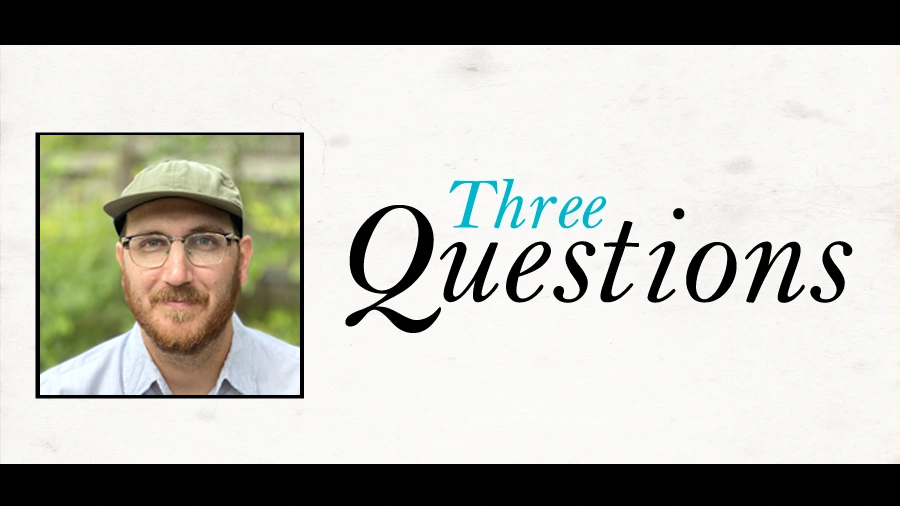
Three Questions with Jason Reed
Jason Reed is a Texas-based artist and educator whose work deals with the confluence of land, politics, and visual histories. He is a Professor of Photography and the Jones Professor of Southwestern Studies at Texas State University and holds a BA in Geography from the University of Texas and an MFA in Photography from Illinois State University. Reed has created exhibitions at venues such as Artpace in San Antonio, Krannert Museum at the University of Illinois in Champaign-Urbana, storefront windows in Miles, Texas, and Galerie Reinthaler in Vienna, Austria. Most recently he started a printed matter project that examines histories and dilemmas of the American West called the Victory in the Wilderness Museum, and his book (co-edited with Molly Sherman) Otherwise, It Would Be Just Another River was published by Spector Books in 2022. Three Questions is an initiative to share the value that our faculty, students, and external patrons derive from using the Portal to Texas History at UNT Libraries. 1. How important is the Portal in your teaching, learning or research? The Portal to Texas History has long been an invaluable tool in both my research and teaching. As a photographer, my world is driven by images, and the Portal serves as a direct conduit to photographers from across the stretches of Texas history. Much of my own photography is about the socio-political landscapes of extraction industries in West Texas. Through the Portal I can build dialogue between my contemporary work and such things as oil drilling operations from the 1930s, the changing landscapes of small oil boom towns that have come and gone, farming practices during the Dust Bowl, or even portraits of 1980s high school all-star football players from the Oil Bowl. I also use the Portal in my courses, asking students to mine the visual histories of this state and build comparisons between their own lives and pictures they are making, and those from the past. 2. How has the Portal changed the way you approach your research, teaching or learning? The most significant aspect of the Portal is that it serves as a hub for the vast array of archives that dot our large state. It would be difficult to travel to each small-town library or institutional archive and piece together the narratives that are possible from a dig through the Portal website. This is the best of what the internet and the digitization of physical archives can be, allowing me and my students to connect to the multiplicity of narratives that help to complicate the history of Texas. 3. What do you want others to know about your research, teaching or learning? My work is born out of my upbringing in West Texas and informed by the stories that were told, but even more so by the stories that have been ignored. As I look at the current landscape of cotton farming, oil extraction, housing development, and migration, I wonder how we make progress toward a more sustainable and equitable future. The Portal gives me a link to the past and an understanding of the resilience and innovation that will be necessary to undertake the massive challenges of the 21st century, ultimately informing the pictures I make and the stories I choose to tell. My current project, The Land of Impossible Causes, will utilize pictures from the Portal and my own work to interweave the varied and intricate social, economic, and environmental narratives of the Permian Basin over the last 100 years, inviting a holistic reflection on where we each fit into the petroleum age at the advent of climate change. Jason Reed is a Texas-based artist and educator whose work deals with the confluence of land, politics, and visual histories. He is a Professor of Photography and the Jones Professor of Southwestern Studies at Texas State University and holds a BA in Geography from the University of Texas and an MFA in Photography from Illinois State University. Reed has created exhibitions at venues such as Artpace in San Antonio, Krannert Museum at the University of Illinois in Champaign-Urbana, storefront windows in Miles, Texas, and Galerie Reinthaler in Vienna, Austria. Most recently he started a printed matter project that examines histories and dilemmas of the American West called the Victory in the Wilderness Museum, and his book (co-edited with Molly Sherman) Otherwise, It Would Be Just Another River was published by Spector Books in 2022. external_relations_in_the_news_three_questions
Posted:
08/31/2023
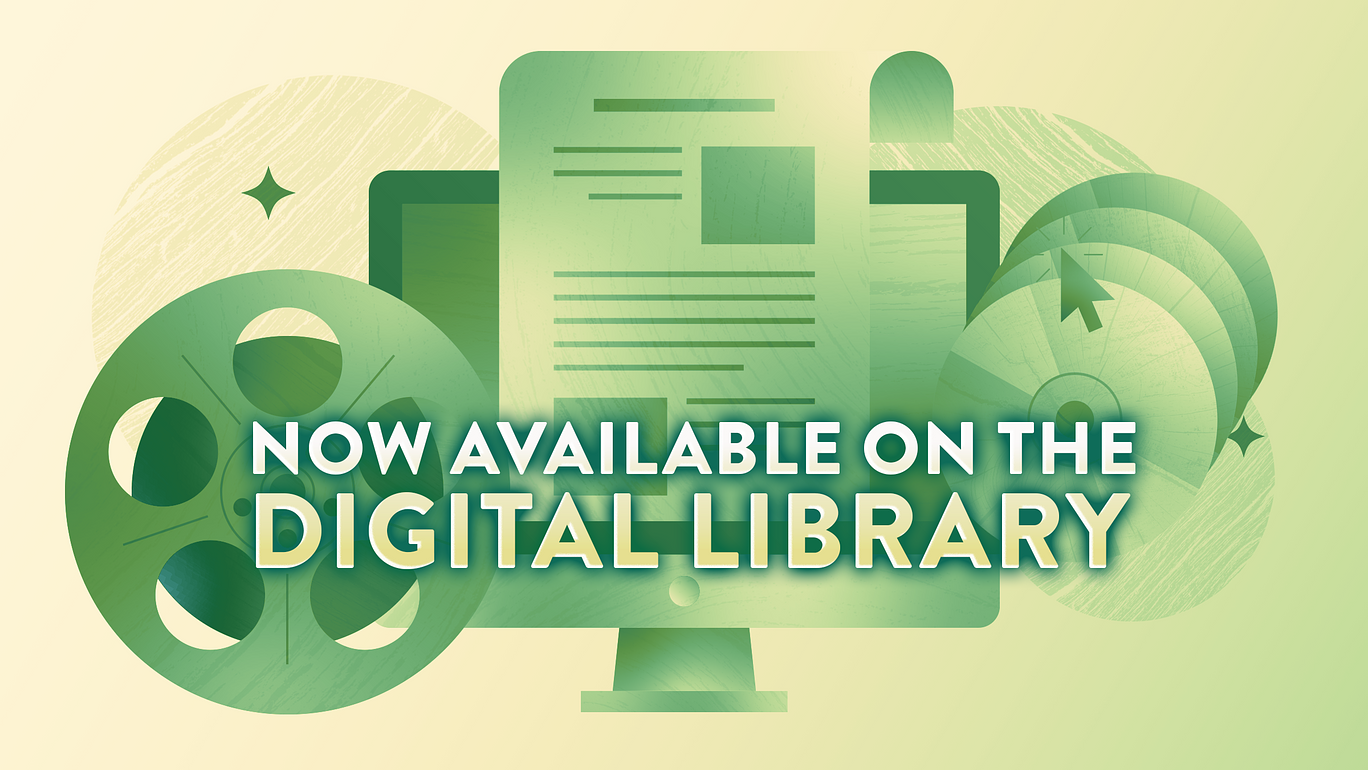
UNT's Spring 2023 Theses and Dissertations Now Available
We recently made our May 2023 graduates’ electronic theses and dissertations (ETDs) available in the UNT Digital Library. The 110 doctoral dissertations and 53 master’s theses join a robust collection of more than 21,000 UNT graduate works dating back to 1936. As the fastest-growing university in Texas, Spring 2023 is another one for the record books, as there was a significant increase in posted degrees over last spring. We recently made our May 2023 graduates’ electronic theses and dissertations (ETDs) available in the UNT Digital Library. The 110 doctoral dissertations and 53 master’s theses join a robust collection of more than 21,000 UNT graduate works dating back to 1936. As the fastest-growing university in Texas, Spring 2023 is another one for the record books, as there was a significant increase in posted degrees over last spring. In 1999, UNT was among the first three American universities requiring students to submit theses and dissertations in electronic format. The UNT Digital Library followed up by retrospectively digitizing all UNT theses and dissertations produced prior to 1999 and added them to the collection. The UNT libraries played leadership role in the implementation of the Vireo ETD submission and management system allows us to add current ETDs promptly each semester after they are approved by the Toulouse Graduate School. Full-text searchable within our digital library, the ETDs are also easy to discover via Google and other search engines— providing immediate global visibility. We also provide access to other forms of scholarly and artistic content created by UNT students including data sets, recital recordings, artwork, problems-in-lieu-of-theses, and honors papers. By delivering integrated, enhanced digital access to these materials, the UNT Digital Library attracts users from more than 200 countries, increasing the impact of UNT students’ scholarship and creativity around the world. digital_libraries_in_the_news_resource_highlight_eresources
Posted:
07/14/2023
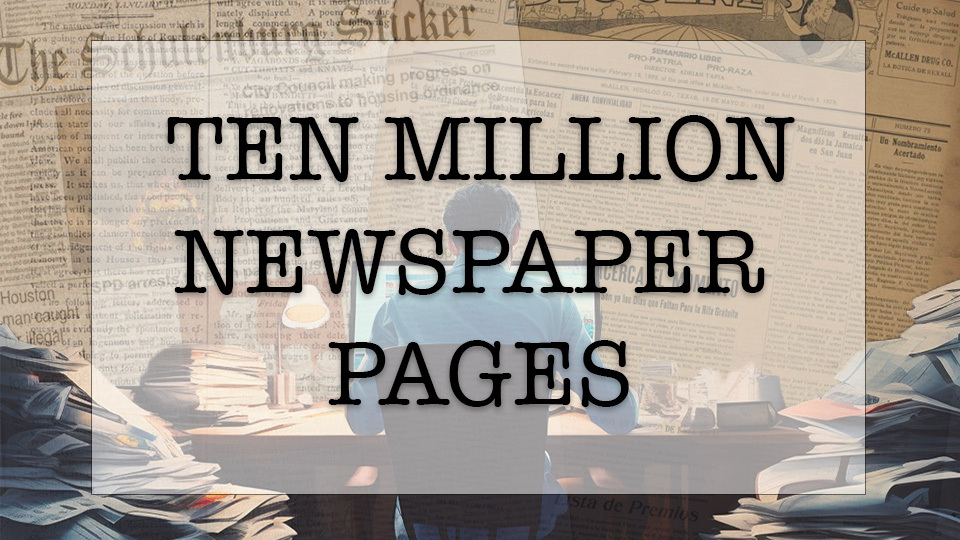
Texas Digital Newspaper Program Reaches Huge Milestone!
On July 7, 2023, the Texas Digital Newspaper Program reached 10 million pages of newspapers. These are newspapers digitally preserved, freely accessible, and fully text-searchable in The Portal to Texas History, hosted by University of North Texas Libraries. On July 7, 2023, the Texas Digital Newspaper Program reached 10 million pages of newspapers. These are newspapers digitally preserved, freely accessible, and fully text-searchable in The Portal to Texas History, hosted by University of North Texas Libraries. Who makes the Texas Digital Newspaper Program possible? Encompassing 912,623 newspaper issues, the TDNP collection is built by partners from across Texas. The top three most contributing partners of newspapers, in order, are: The Abilene Library Consortium, who have supported digitization of 44,753 newspaper issues from titles across Texas. The Denton Public Library, with Denton-area newspapers contributed, mostly from the Denton Record Chronicle, totaling 15,763 issues. The Cuero Public Library, adding The Cuero News, have contributed 14,671 issues. The Texas Digital Newspaper Program collection represents a massive endeavor in preservation, digitization, and digital access to news content. Spanning over 200 years of history from or related to Texas and the South, TDNP includes newspapers in Spanish, German, Czech, Hebrew, Chinese, Italian, French, and Swedish, as well as one serial title in Esperanto. This past year, we have added newspaper titles from communities as small as 612 in population, as well as from big cities, including Houston, Dallas, San Antonio and Galveston, among others. Additions of newspapers in TDNP have been made possible through generous support from multiple groups, including: National Endowment for the Humanities Institute of Museum and Library Services Texas State Library & Archives Commission Tocker Foundation Ladd & Katherine Hancher Foundation Summerlee Foundation In addition to these sponsors of digital newspaper preservation, partners from cities all over Texas have worked very hard to prepare their newspaper collections for preservation and digital access. A range of tasks go into digitizing a community newspaper, from grant-writing by partnering groups, rescuing newspapers from such places as high hurricane-risk locations, filing cabinets, hot and leaky barns, backs of trucks, or abandoned buildings, to name a few examples of how far contributors have gone to rescue newspapers. Many private individuals have helped their local public libraries prepare grant applications to fund building access to their community newspapers, saying things like, “Our community might not be here in 50 years, but I know our newspapers will be available and visible through The Portal to Texas History.” The ability of TDNP to guarantee long-term preservation and access in perpetuity is also possible because of The Cathy Nelson Hartman Portal to Texas History Endowment, which, “. . . enables UNT to extend the impact of the Portal by creating a permanent, sustainable source of income.” digital_libraries_in_the_news_resource_highlight_eresources
Posted:
07/12/2023
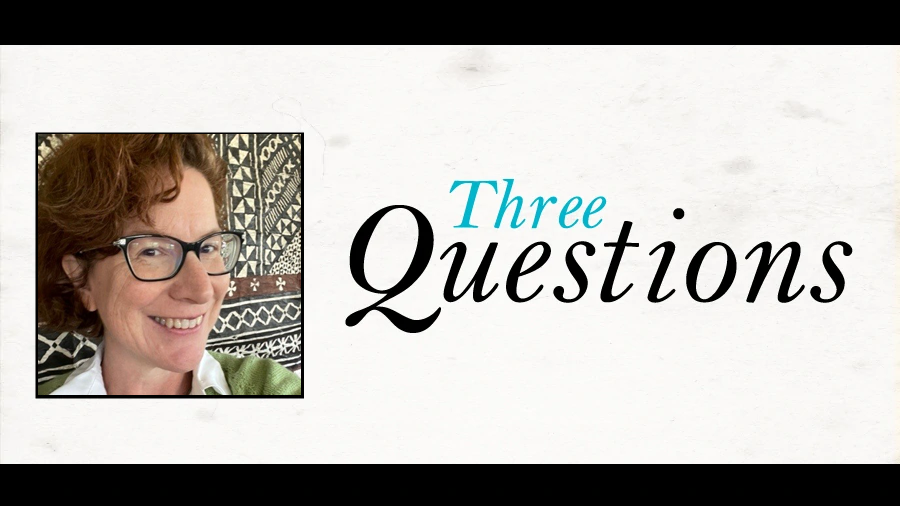
Three Questions with Amy E. Earhart
Amy E. Earhart is Associate Professor of English and affiliated faculty of Africana Studies at Texas A&M University. She has published a monograph Traces of Old, Uses of the New: The Emergence of Digital Literary Studies (U Michigan Press 2015), a co-edited collection The American Literature Scholar in the Digital Age (U Michigan Press 2010), and a number of articles and book chapters in volumes including the Debates in Digital Humanities series, DHQ, DSH: Digital Scholarship in the Humanities, Digital Studies/Le champ numérique, and Textual Cultures. Her current book, “A Compromised Infrastructure: Digital Humanities, African American Literary History and Technologies of Identity,” is under advance contract with Stanford University Press. Earhart has also published digital projects constructed to expand access to African American literary and cultural materials, as is the case with projects The Millican Massacre, 1868, DIBB: The Digital Black Bibliographic Project, and “Alex Haley’s Malcolm X: ‘The Malcolm X I knew’ and notecards from The Autobiography of Malcolm X”. Awarded a NEH-Mellon Fellowship for Digital Publication in 2020 as well as other grants, Earhart has also won several teaching awards, including the University Distinguished Achievement Award from The Association of Former Students and Texas A&M University. Three Questions is an initiative to share the value that our faculty, students, and external patrons derive from using the Portal to Texas History at UNT Libraries. 1. How important is the Portal in your teaching, learning or research? The Portal is an invaluable resource in my research and teaching. In July of 1868, a shift towards equality for Blacks after Reconstruction incited one of the largest “race riots” in Texas, known today as the Millican Massacre. As I have developed the Millican Massacre 1868 digital project I have returned, again and again, to the materials included in the Portal, particularly the Texas newspapers. This rich set of documents has allowed me to bring the story of an important but undertold history to the general public. In addition, I have used the Portal in my courses, incorporating research and digital humanities assignments that would not otherwise have been possible. Students are able to locate historical materials that bring depth and nuance to the literary texts that we read. In addition, they benefit from examining the way that the Portal categorizes and organizes information, leaving my classes with a better understanding of the why and how of research. 2. How has the Portal changed the way you approach your research, teaching or learning? The open access materials in the Portal have allowed me to position students as active learners and researchers, revealing how scholars work with large archives to reach conclusions about historical events. Students often have an Oh! moment when working with the historical newspapers, in particular, understanding the nuances of how incidents of racial violence were discussed in the press. As I have researched the Millican Massacre I have introduced descendants and community members to the information freely available in the Portal. They are amazed at the information that they might locate and grateful for what the Portal tells them about their families and their communities. 3. What do you want others to know about your research, teaching or learning? My work on the Millican Massacre has largely focused on returning this important historical event to contemporary knowledge. With the Portal I have been able to document the events, and with this research, much obtained in the Portal materials, we have received a Texas Historical marker to ensure that the massacre is not forgotten. Further, my research is merged with teaching as well as community outreach in order to best meet the needs of those who continue to be impacted by the reverberations of such violence. I am a literary scholar who is interested in how the events of 1868 Millican are narrated, told, and retold and how those narratives continue to impact us. The public facing digital humanities site, soon to be relaunched with additional materials, allows users to not only learn about the event, but to examine primary sources. Without the Portal my research and teaching would be far less complete. Amy E. Earhart is Associate Professor of English and affiliated faculty of Africana Studies at Texas A&M University. She has published a monograph Traces of Old, Uses of the New: The Emergence of Digital Literary Studies (U Michigan Press 2015), a co-edited collection The American Literature Scholar in the Digital Age (U Michigan Press 2010), and a number of articles and book chapters in volumes including the Debates in Digital Humanities series, DHQ, DSH: Digital Scholarship in the Humanities, Digital Studies/Le champ numérique, and Textual Cultures. Her current book, “A Compromised Infrastructure: Digital Humanities, African American Literary History and Technologies of Identity,” is under advance contract with Stanford University Press. Earhart has also published digital projects constructed to expand access to African American literary and cultural materials, as is the case with projects The Millican Massacre, 1868, DIBB: The Digital Black Bibliographic Project, and “Alex Haley’s Malcolm X: ‘The Malcolm X I knew’ and notecards from The Autobiography of Malcolm X”. Awarded a NEH-Mellon Fellowship for Digital Publication in 2020 as well as other grants, Earhart has also won several teaching awards, including the University Distinguished Achievement Award from The Association of Former Students and Texas A&M University. external_relations_in_the_news_three_questions
Posted:
07/06/2023
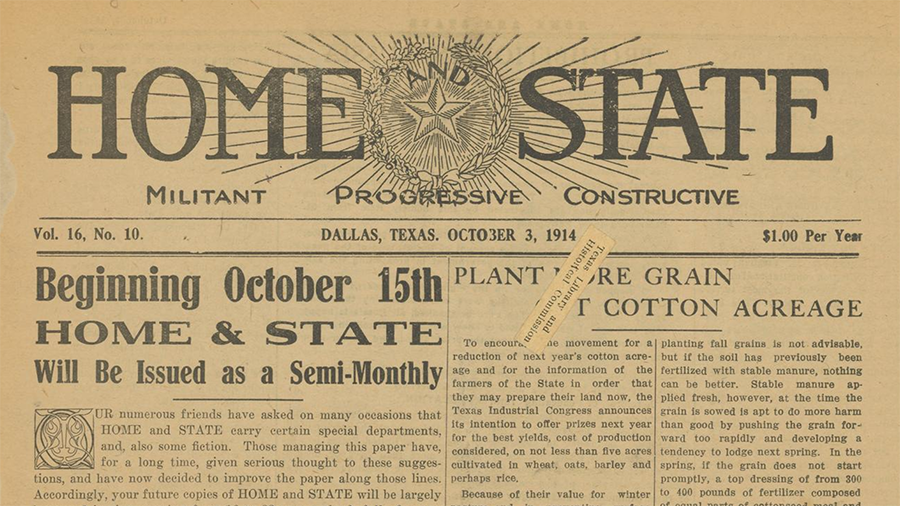
Historical Newspapers Now Available Online Through Partnership with Texas State Library and Archives Commission
The University of North Texas Libraries are excited to announce a new partnership between The Portal to Texas History and the Texas State Library and Archives Commission (TSLAC). This partnership will result in free and open access to public domain newspapers held by TSLAC. The newspapers will fill chronological and geographic gaps in the Texas Digital Newspaper Program collection. The University of North Texas Libraries are excited to announce a new partnership between The Portal to Texas History and the Texas State Library and Archives Commission (TSLAC). This partnership will result in free and open access to public domain newspapers held by TSLAC. The newspapers will fill chronological and geographic gaps in the Texas Digital Newspaper Program collection. By August 2023, the collection will include such Dallas-area titles as: Civil War years of The Dallas Herald, The Prohibition-era, labor newspaper, Home and State, And turn-of-the-century years of the Methodist Texas Christian Advocate In addition, this will expand content from West Texas, including the Wichita Daily Times, from Wichita Falls; The Amarillo Daily News; and The Terry County Herald from Brownfield. “This partnership represents an exciting endeavor in both preservation and collaboration,” said Dr. Ana Krahmer, Director of UNT Libraries’ Digital Newspaper Program. “We look forward both to adding further newspaper titles to the TSLAC collection, as well as to building relationships with more Texas cities whose public domain newspapers will be newly available because of this partnership.” Approaching 10 million newspaper pages, the Texas Digital Newspaper Program, hosted on The Portal to Texas History, is the largest, single-state, open-access interface to digital newspapers in the U.S. This partnership represents an endeavor in both preservation and collaboration, and we look forward both to adding further newspaper titles to the TSLAC collection, as well as to building relationships with more Texas cities whose public domain newspapers will be newly available because of this partnership. The Portal to Texas History is a gateway to rare, historical, and primary source materials from or about Texas. Created and maintained by the University of North Texas Libraries, the Portal leverages the power of hundreds of content partners across the state to provide a vibrant, growing collection of resources. Access to the Texas State Library and Archive Commission Newspaper Collection in The Portal to Texas History is here. About UNT Libraries As the most-used service on campus and an essential component of education and research at UNT, the Libraries offer access to more than 6 million print and digital items along with innovative programs and support services and expert personnel to assist patrons in achieving their academic and scholarly goals. About UNT Established in 1890, UNT is one of the nation’s largest public research universities with more than 44,000 students. Ranked a Tier One research university by the Carnegie Classification, UNT is a catalyst for creativity, fueling progress, innovation and entrepreneurship for the North Texas region and the state. UNT’s programs are internationally recognized with research and scholarship spanning all disciplines. World-class faculty are making breakthroughs every day, and UNT students and alumni are changing the world around them. About TSLAC The Texas State Library and Archives Commission provides Texans access to the information needed to be informed, productive citizens by preserving the archival record of Texas; enhancing the service capacity of public, academic and school libraries; assisting public agencies in the maintenance of their records; and meeting the reading needs of Texans with disabilities. For more information, visit www.tsl.texas.gov. digital_libraries_in_the_news_resource_highlight_eresources
Posted:
06/14/2023
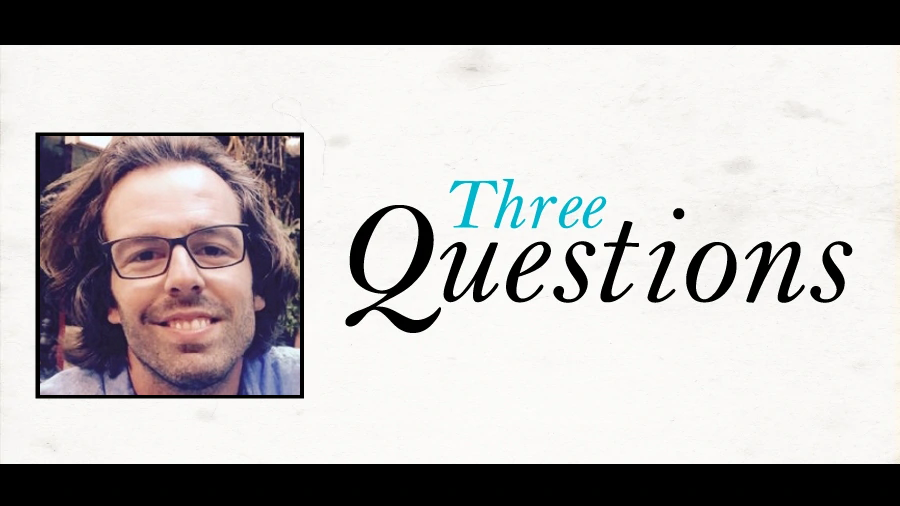
Three Questions with William Scarborough
I am currently an Assistant Professor in the Department of Sociology. My research examines gender and racial inequalities across the U.S. My work has been cited in the U.S. House of Representatives and recently used in reports from the Executive Office of the President. I am the author of Gendered Places: The Landscape of Local Gender Norms Across the United States as well as multiple articles in journal such as the American Sociological Review and Gender & Society. Three Questions is an initiative to share the value that our faculty, students, and external patrons derive from using the Portal to Texas History at UNT Libraries. 1. How important is the Portal in your teaching, learning or research? The Portal is a valuable tool for students to become producers of knowledge in addition to consumers of knowledge in the classroom. For my course, students use the portal to uncover events in local communities’ pasts that may have enduring consequences on local social dynamics, but have been long forgotten or rendered invisible. For example, students in my course identity patterns of contemporary residential racial segregation in their communities, and then use the portal to investigate events that may have led to such patterns. They have uncovered, for example, how some municipalities in the early 1900s voted to relocate Black communities to parts of town that remain segregated today. Others used violence for residential displacement. Uncovering these historical sources of contemporary patterns of segregation, students are better positioned to make suggestions on how to address local inequalities in their community. 2. How has the Portal changed the way you approach your research, teaching or learning? The Portal is a valuable tool for students to move beyond the acquisition of course concepts, but to apply them and expand upon them. 3. What do you want others to know about your research, teaching or learning? Ultimately, my courses aim to teach students how to address social problems by using sociological theory to inform them where to look, and sociological methods as the tools to uncover the factors that contribute to and sustain these problems. I am currently an Assistant Professor in the Department of Sociology. My research examines gender and racial inequalities across the U.S. My work has been cited in the U.S. House of Representatives and recently used in reports from the Executive Office of the President. I am the author of Gendered Places: The Landscape of Local Gender Norms Across the United States as well as multiple articles in journal such as the American Sociological Review and Gender & Society. external_relations_in_the_news_three_questions
Posted:
05/17/2023
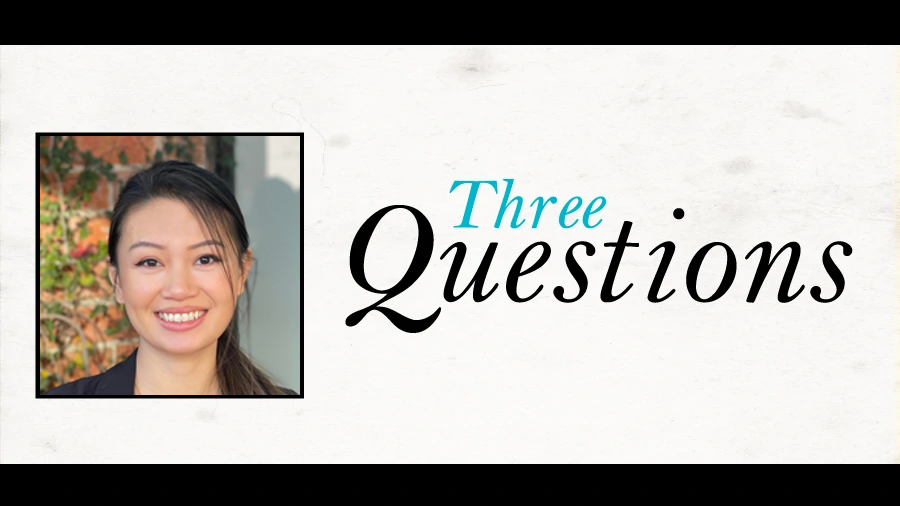
Three Questions with Ann Ngoc Tran
Ann Ngoc Tran is a Ph.D. student in the Department of American Studies & Ethnicity at the University of Southern California. Her research weaves Critical Refugee Studies, Native and Southeast Asian Maritime Studies, and Black feminist frameworks to study the cultural history and memory of the Vietnamese fishing boat across Viet Nam, the Pacific Ocean, and U.S. Gulf South. She looks specifically at the complex experiences of fisherfolk and boat refugees through a material analysis of the boat, an object that indexes imperialism, war, and migration as well as survival and ordinary life-making practices across time and space. Three Questions is an initiative to share the value that our faculty, students, and external patrons derive from using the Portal to Texas History at UNT Libraries. 1. How important is the Portal in your teaching, learning or research? The Portal has been an incredible learning and research tool for me. I often have trouble finding maps and newsletters that are probably archived and annotated, and the Portal makes it so much easier to find relevant documents and photographs with its highly accessible search tool and database. Most importantly, I find that although it doesn’t find all of my search terms, it directs me to relevant information that I can use as contextual detail in my work. I have found the maps to be the most useful for learning about the landscape and waterscape of the Gulf Coast. I began my research with the question: How and where did various communities form across Texas’s history? Thanks to the Portal, I have been able to learn more about towns like Seadrift, Seadrift, Port Arthur, and Corpus Christi. 2. How has the Portal changed the way you approach your research, teaching or learning? As a historian of the Texas Gulf Coast, I have found the Portal to Texas History to be an invaluable resource that offers a plethora of documents and photographs on the rich history of this region. The Portal provides quick access to primary documents that have transformed the Texas landscape, including newsletters from various churches and community organizations that have transformed the local towns along the coast as well as the responses to the war in Southeast Asia from various angles—religious, political, and cultural. Through my exploration of the Portal, I have discovered numerous research ideas that could be realized with its vast array of data, most specifically the use of cartographic images of the Coast and its changes over time. In my future career, I plan to incorporate the Portal into my teaching, offering my students the opportunity to view primary documents from specific time periods and gain a deeper understanding of the socio-political landscapes of the Gulf Coast. By utilizing the resources of the University of North Texas library, I am confident that I can accomplish this quickly and effectively. 3. What do you want others to know about your research, teaching or learning? A large part of my project, which spans the geography of Vietnam, the Pacific Ocean, and the U.S. Gulf South, takes place over the course of the 19th and 20th centuries. In the third part of my dissertation, I historicize the formation of Vietnamese American communities on the Gulf Coast, centering specific themes such as water, fishing/shrimping economies, and environmental crises, thinking deeply with concepts from political economy and creative life-making. The research will employ the theoretical frameworks of racial capitalism, war and militarism, and environmental justice to analyze these themes. Presently, most studies of Vietnamese on the Gulf Coast are quantitative analyses in the social sciences, emphasizing survival, resilience, and assimilation rather than race, political economy, and environmental crises. My cultural historical approach prioritizes the latter elements in order to decenter uncritical and positivist readings of Vietnamese communities around the Gulf of Mexico. Ann Ngoc Tran is a Ph.D. student in the Department of American Studies & Ethnicity at the University of Southern California. Her research weaves Critical Refugee Studies, Native and Southeast Asian Maritime Studies, and Black feminist frameworks to study the cultural history and memory of the Vietnamese fishing boat across Viet Nam, the Pacific Ocean, and U.S. Gulf South. She looks specifically at the complex experiences of fisherfolk and boat refugees through a material analysis of the boat, an object that indexes imperialism, war, and migration as well as survival and ordinary life-making practices across time and space. external_relations_in_the_news_three_questions
Posted:
04/28/2023
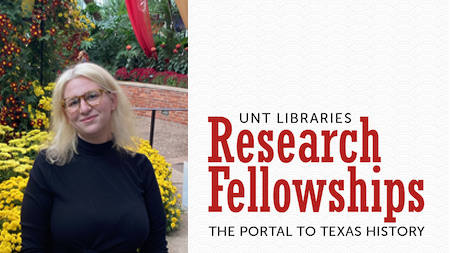
The Portal to Texas History 2023 Research Fellowship Awardee - Montana Williamson
Montana Williamson is a doctoral candidate and graduate teaching assistant at West Virginia University. Her research has been supported by the Eberly College at WVU, the WVU History Department, the WVU Women and Gender Studies Department, and the West Virginia Humanities Council. She has worked as a research assistant for the Civil War Governors of Kentucky and the West Virginia Humanities Council. She is the recipient of the Robert and Wynona Wilkins Award for Outstanding Graduate Teaching Assistant. The Portal to Texas History 2023 Research Fellowship Awardee Montana Williamson Project Title Reconstructing Motherhood: Identity, Labor, and Rebuilding in Nineteenth-Century Texas Project Description This project focuses on the enslaved and slaveholding women who refugeed in Civil War era Texas. I want to explore the ways that this movement, along with emancipation, impacted these women’s sense of identity and understanding of motherhood. I’m particularly interested in how these women redefined their role as mothers in the immediate aftermath of the war. Biography Montana Williamson is a doctoral candidate and graduate teaching assistant at West Virginia University. Her research has been supported by the Eberly College at WVU, the WVU History Department, the WVU Women and Gender Studies Department, and the West Virginia Humanities Council. She has worked as a research assistant for the Civil War Governors of Kentucky and the West Virginia Humanities Council. She is the recipient of the Robert and Wynona Wilkins Award for Outstanding Graduate Teaching Assistant. digital_libraries_in_the_news_honors_and_awards_research_fellowships
Posted:
04/27/2023
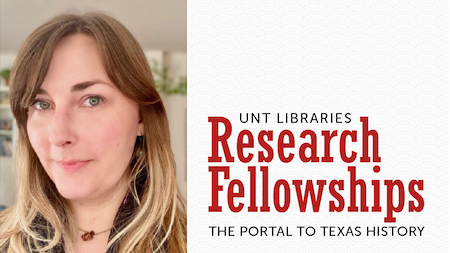
The Portal to Texas History 2023 Research Fellowship Awardee - Ashley E. Williams
Ashley is a PhD candidate in art history at Columbia University. She has contributed to exhibitions at the National Gallery of Art, the Blanton Museum of Art, the Wallach Art Gallery, and Bard Graduate Center Gallery. Ashley’s research has been supported by the Museum of Early Southern Decorative Arts, the Decorative Arts Trust, the Museum of Fine Arts Houston, and the Texas State Historical Association. She will be a 2023-2024 fellow at the Smithsonian American Art Museum. She was born and raised in Austin, Texas. The Portal to Texas History 2023 Research Fellowship Awardee Ashley E. Williams Project Title Clay, Salt, and Fire: The Wilson Potters of Guadalupe County, Texas Project Description This dissertation chapter examines unfree artistic labor in Texas via the stories of Hiram, James, and Wallace Wilson—enslaved potters who crafted elegant stoneware vessels in the 1860s. In their very form and materiality these ceramics embodied conflicts of land, agency, and personhood under slavery and settler colonialism. This case study also turns to the period after Emancipation, when the potters founded their own successful H. Wilson & Company pottery: the first Black-owned business in Texas. Biography Ashley is a PhD candidate in art history at Columbia University. She has contributed to exhibitions at the National Gallery of Art, the Blanton Museum of Art, the Wallach Art Gallery, and Bard Graduate Center Gallery. Ashley’s research has been supported by the Museum of Early Southern Decorative Arts, the Decorative Arts Trust, the Museum of Fine Arts Houston, and the Texas State Historical Association. She will be a 2023-2024 fellow at the Smithsonian American Art Museum. She was born and raised in Austin, Texas. digital_libraries_in_the_news_honors_and_awards_research_fellowships
Posted:
04/27/2023
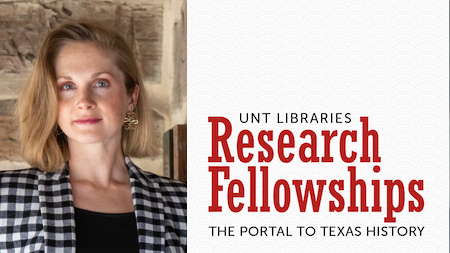
The Portal to Texas History 2023 Research Fellowship Awardee - Dr. Whitney Nell Stewart
Whitney Nell Stewart is a historian of the US South. She is author of This Is Our Home: Slavery and Struggle on Southern Plantations (University of North Carolina Press, forthcoming Fall 2023), as well as articles in Winterthur Portfolio, Journal of Social History, and Journal of the Early Republic, among other publications. Her work has been supported by a National Endowment for the Humanities Long-Term Fellowship at the American Antiquarian Society, as well as research and writing fellowships at the Smithsonian, the McNeil Center for Early American Studies at the University of Pennsylvania, the Huntington Library, and the Texas State Historical Association, among others. She is an assistant professor of history and faculty in the Edith O’Donnell Institute of Art History at the University of Texas at Dallas. The Portal to Texas History 2023 Research Fellowship Awardee Dr. Whitney Nell Stewart Project Title The Story of Texas: History-Making at Varner-Hogg Plantation Project Description “The Story of Texas: History-Making at Varner-Hogg Plantation” explores the transformation of a single southeast Texas plantation over two hundred years, guiding readers through Varner-Hogg’s changing landscape from Indigenous homeland to Old 300 settlement, sugar plantation to oil field, private home to public museum. In charting the changing purpose and meaning of this one place, “The Story of Texas” also examines exactly how, who, and what makes history in the Lone Star State. Biography Whitney Nell Stewart is a historian of the US South. She is author of This Is Our Home: Slavery and Struggle on Southern Plantations (University of North Carolina Press, forthcoming Fall 2023), as well as articles in Winterthur Portfolio, Journal of Social History, and Journal of the Early Republic, among other publications. Her work has been supported by a National Endowment for the Humanities Long-Term Fellowship at the American Antiquarian Society, as well as research and writing fellowships at the Smithsonian, the McNeil Center for Early American Studies at the University of Pennsylvania, the Huntington Library, and the Texas State Historical Association, among others. She is an assistant professor of history and faculty in the Edith O’Donnell Institute of Art History at the University of Texas at Dallas. digital_libraries_in_the_news_honors_and_awards_research_fellowships
Posted:
04/27/2023
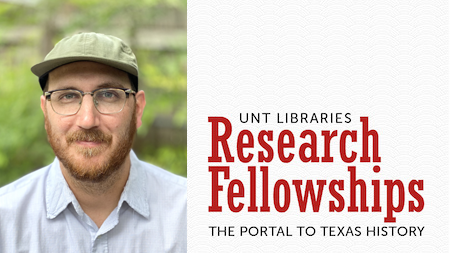
The Portal to Texas History 2023 Research Fellowship Awardee - Jason Reed
Jason Reed is a Texas-based artist and educator whose work deals with the confluence of land, politics, and visual histories. He is a Professor of Photography and the Jones Professor of Southwestern Studies at Texas State University and holds a BA in Geography from the University of Texas and an MFA in Photography from Illinois State University. Reed has created exhibitions at venues such as Artpace in San Antonio, Krannert Museum at the University of Illinois in Champaign-Urbana, storefront windows in Miles, Texas, and Galerie Reinthaler in Vienna, Austria. The Portal to Texas History 2023 Research Fellowship Awardee Jason Reed Project Title The Land of Impossible Causes Project Description The purpose of this project, tentatively titled The Land of Impossible Causes, is to create a book that interweaves the varied and intricate social, economic, and environmental narratives of the Permian Basin over the last 100 years through a combination of my contemporary photographs and writing with archival materials from The Portal to Texas History and UNT Digital Library. Biography Jason Reed is a Texas-based artist and educator whose work deals with the confluence of land, politics, and visual histories. He is a Professor of Photography and the Jones Professor of Southwestern Studies at Texas State University and holds a BA in Geography from the University of Texas and an MFA in Photography from Illinois State University. Reed has created exhibitions at venues such as Artpace in San Antonio, Krannert Museum at the University of Illinois in Champaign-Urbana, storefront windows in Miles, Texas, and Galerie Reinthaler in Vienna, Austria. digital_libraries_in_the_news_honors_and_awards_research_fellowships
Posted:
04/27/2023
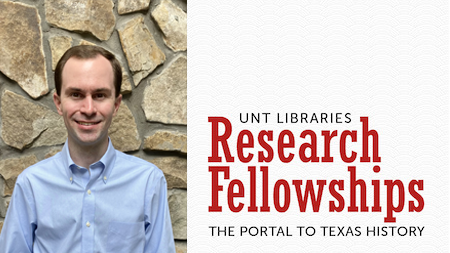
The Portal to Texas History 2023 Research Fellowship Awardee - William Robert Billups
William Robert Billups is a history PhD candidate at Emory University and an incoming 2023–2024 Ambrose Monell Foundation Funded National Fellow in Technology and Democracy at the Jefferson Scholars Foundation in Charlottesville, Virginia. He researches racial violence and its effects on the civil rights movement and US law and law enforcement. Before beginning his PhD at Emory University, Robert earned a Bachelor’s degree in History from the University of Notre Dame and a Master’s degree in American History from the University of Cambridge. He has written public-facing scholarship for the Washington Post and peer-reviewed articles for the Journal of American History and the Journal of Southern History. The Portal to Texas History 2023 Research Fellowship Awardee William Robert Billups Project Title “Reign of Terror”: Anti–Civil Rights Terrorism in the United States, 1955–1977 Project Description Robert’s dissertation is the first comprehensive study of bombings and arsons against US civil rights activists, allies, and institutions from the mid–1950s through the mid–1970s. Using digital maps and tools, it assesses waves of white supremacist attacks and illuminates major patterns of mid-century racial violence. His dissertation also employs case studies to analyze how individuals and communities experienced anti–civil rights terrorism, resisted it, remembered it, and rebuilt in its wake. Biography William Robert Billups is a history PhD candidate at Emory University and an incoming 2023–2024 Ambrose Monell Foundation Funded National Fellow in Technology and Democracy at the Jefferson Scholars Foundation in Charlottesville, Virginia. He researches racial violence and its effects on the civil rights movement and US law and law enforcement. Before beginning his PhD at Emory University, Robert earned a Bachelor’s degree in History from the University of Notre Dame and a Master’s degree in American History from the University of Cambridge. He has written public-facing scholarship for the Washington Post and peer-reviewed articles for the Journal of American History and the Journal of Southern History. digital_libraries_in_the_news_honors_and_awards_research_fellowships
Posted:
04/27/2023
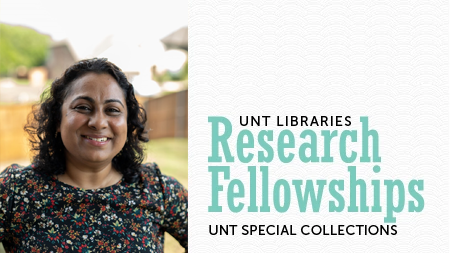
UNT Special Collections 2023 Research Fellowship Awardee - Dr. Newly Paul
Newly Paul is a media and politics researcher and assistant professor of journalism at the University of North Texas. Her research areas include intercultural communication, race and gender in politics, and entertainment studies through a gendered lens. She has taught various journalism classes such as principles of news, news reporting and writing, copyediting, political reporting, and minorities in media. UNT Special Collections 2023 Research Fellowship Awardee Project Title Empowered narratives: How BLK magazine represented Black LGBTQ people during the AIDS epidemic Project Description Dr. Paul’s project examines the role played by BLK magazine in informing and advocating for the Black LGBTQ population in the U.S. during the 1990s AIDS epidemic. It uses archived issues of BLK to conduct a content analysis of the articles, advertisements and images published in the magazine from its inception in 1988 to its closure in 1994. The aim is to understand the role played by BLK in the Black gay rights movement of the country. Biography Newly Paul is a media and politics researcher and assistant professor of journalism at the University of North Texas. Her research areas include intercultural communication, race and gender in politics, and entertainment studies through a gendered lens. She has taught various journalism classes such as principles of news, news reporting and writing, copyediting, political reporting, and minorities in media. special_collections_in_the_news_honors_and_awards_research_fellowships
Posted:
04/11/2023
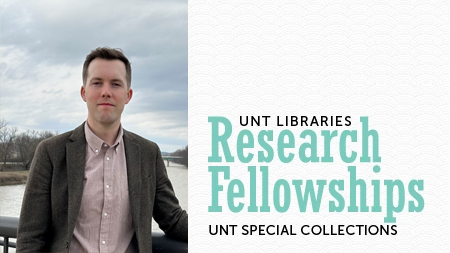
UNT Special Collections 2023 Research Fellowship Awardee - Dr. Christopher Ewing
Christopher Ewing is an assistant professor of history at Purdue University. His book, The Color of Desire: The Queer Politics of Race in the Federal Republic of Germany after 1970, examines the entanglement of racism and antiracism in shaping queer German movements in the aftermath of gay liberation. He has published in The Journal of the History of Sexuality, Sexualities, and Sexuality & Culture and is currently co-editing a collection titled Reading Queer Media, under contract with Palgrave Macmillan. UNT Special Collections 2023 Research Fellowship Awardee Project Title Hate Crimes: A Transatlantic History of Germany’s Violent ‘90s Project Description Dr. Ewing’s project asks how the concept of hate criminality became a useful way for activists, policy makers, and law enforcement to make sense of the surge in reported violence in the aftermath of German unification. Starting with queer and anti-racist violence prevention programs in the United States in the 1980s, this project traces the development and circulation of the concept of “hate crimes” across the Atlantic. In so doing, it argues that far from being a fixed term, hate criminality became a multivalent idea that would have unintended consequences for the politics of race on both sides of the Atlantic. Biography Christopher Ewing is an assistant professor of history at Purdue University. His book, The Color of Desire: The Queer Politics of Race in the Federal Republic of Germany after 1970, examines the entanglement of racism and antiracism in shaping queer German movements in the aftermath of gay liberation. He has published in The Journal of the History of Sexuality, Sexualities, and Sexuality & Culture and is currently co-editing a collection titled Reading Queer Media, under contract with Palgrave Macmillan. special_collections_in_the_news_honors_and_awards_research_fellowships
Posted:
04/11/2023
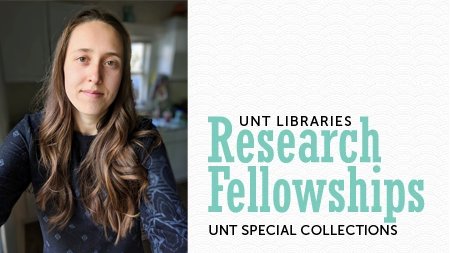
UNT Special Collections 2023 Research Fellowship Awardee - Anna Chotlos
Anna Chotlos’s essays and poems have recently appeared in Split Lip, Hotel Amerika, Sweet Lit, and River Teeth’s Beautiful Things. She holds an MA from Ohio University and now teaches and writes in Denton, Texas where she is pursuing a PhD in creative writing at the University of North Texas. UNT Special Collections 2023 Research Fellowship Awardee Project Title Creative writings which focus on formally-inventive nonfiction, tradition and reinvention in poetry, and the use of artifacts and images in personal essays and memoir. Project Description Anna Chotlos’ project examines the possibilities of images and artifacts in essays. She will explore the library’s collection of artist’s books and the James Flowers Collection of Ephemera Found in Returned Library Books to write an essay about coincidence, memory, what makes something important enough to keep, and what our objects and notes, especially the things we discard or lose, say about who we are. Biography Anna Chotlos’s essays and poems have recently appeared in Split Lip, Hotel Amerika, Sweet Lit, and River Teeth’s Beautiful Things. She holds an MA from Ohio University and now teaches and writes in Denton, Texas where she is pursuing a PhD in creative writing at the University of North Texas. special_collections_in_the_news_honors_and_awards_research_fellowships
Posted:
04/11/2023
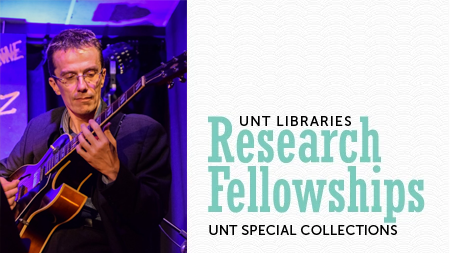
UNT Special Collections 2023 Research Fellowship Awardee - Stéphane Audard
Stéphane Audard, jazz guitarist, has recorded with Michel Legrand. He teaches at the Paris Conservatory and directs the Sorbonne Big Band. He is currently a doctoral student at Sorbonne University under the direction of Laurent Cugny. He is an associate researcher at the musicology laboratory (Iremus) of the National Center of Scientific Research (CNRS). UNT Special Collections 2023 Research Fellowship Awardee Project Title History of Jazz Education: Pedagogical, Theoretical, and Musical Issues Project Description The time period that Stéphane Audard is studying extends from the establishment of jazz education at North Texas State Teachers College to the late 1960s. His work focuses mainly on Gene Hall and Leon Breeden, who are the two major figures of this period. The issues he is studying are: the establishment of the curriculum, the place of jazz and its legitimization in the institution, the influence of the orchestras at the local and national level, and the relations with the high school stage bands. Biography Stéphane Audard, jazz guitarist, has recorded with Michel Legrand. He teaches at the Paris Conservatory and directs the Sorbonne Big Band. He is currently a doctoral student at Sorbonne University under the direction of Laurent Cugny. He is an associate researcher at the musicology laboratory (Iremus) of the National Center of Scientific Research (CNRS). special_collections_in_the_news_honors_and_awards_research_fellowships
Posted:
04/11/2023

Three Questions with Dr. Kerry Goldmann
Dr. Kerry Goldmann is a Lecturer and Associate Director of Graduate Studies in UNT’s history department. She is an historian of Jewish American history, African American history, and American culture. Her research investigates the intersecting histories of subaltern communities and art used for social change, and she is currently working on a book project that examines the black-founded theatre companies between 1960 and 1980 that helped mobilize Cultural Nationalism for cultural and social liberation. Dr. Goldmann is especially passionate about investing in the classroom as a site that fosters intellectual curiosity and a reverence for history. As an interdisciplinary student, she employs various methodologies in each class ranging from traditional historical approaches to digital history and cultural lenses. Three Questions is an initiative to share the value that our faculty, students, and external patrons derive from using the Portal to Texas History at UNT Libraries. 1. How important is the Portal in your teaching, learning or research? In terms of research, the Portal has been invaluable in examining archives of Black Texas theatres for my monograph and investigating archives for a future Texas supreme Court Case, of which I’m serving as an historian for the prosecution. I also use the portal in my upper-level history courses to support student research for their end-of-semester projects. The Portal to Texas History allows my students to be self-empowered in the work of an historian. 2. How has the Portal changed the way you approach your research, teaching or learning? The Portal has especially changed my approach to teaching because archival research is usually only discussed in class as a method. The Portal allows us to put it into practice, and it allows students to dive into rich sources that allow them to see significant history at a very local level. In turn, students find history more accessible, relevant, and connective. Additionally, as a cultural historian teaching mainly cultural history classes, I appreciate how many cultural sources and archives the Portal provides. 3. What do you want others to know about your research, teaching or learning? My teaching prioritizes accessibility of knowledge and creating independent thinkers and researchers. As an element of democratizing knowledge, I aim to diversify the historical perspective from one singular group, which the Portal supports. Dr. Kerry Goldmann is a Lecturer and Associate Director of Graduate Studies in UNT’s history department. She is an historian of Jewish American history, African American history, and American culture. Her research investigates the intersecting histories of subaltern communities and art used for social change, and she is currently working on a book project that examines the black-founded theatre companies between 1960 and 1980 that helped mobilize Cultural Nationalism for cultural and social liberation. Dr. Goldmann is especially passionate about investing in the classroom as a site that fosters intellectual curiosity and a reverence for history. As an interdisciplinary student, she employs various methodologies in each class ranging from traditional historical approaches to digital history and cultural lenses. external_relations_in_the_news_three_questions
Posted:
03/21/2023
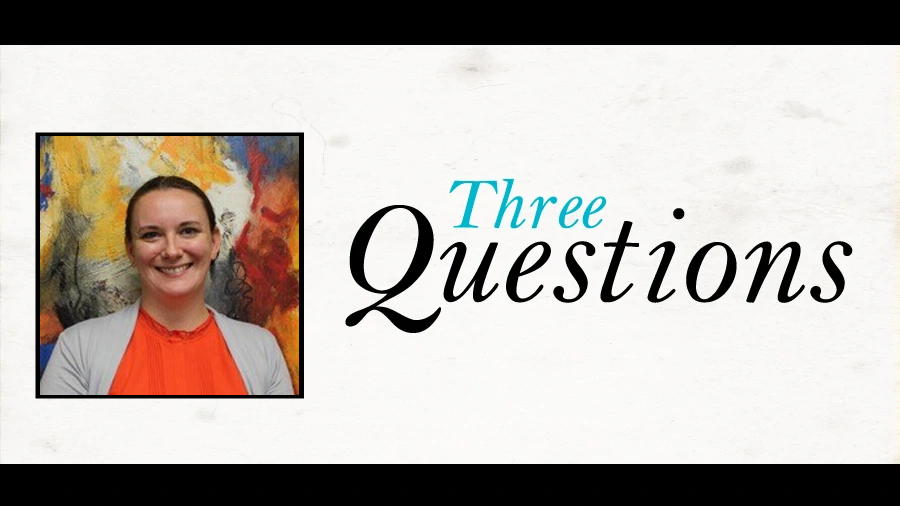
Three Questions with Sarah Vegerano
Sarah Vegerano is a Ph.D. student studying the development of education and its relationship with race in Texas at Texas A&M University, and she has a certificate in Digital Humanities. Her research focuses on census data, local newspapers, communities identifying as White, Black, and Hispanic with the highest enrollments through the last half of the nineteenth century, and textbooks used in the classroom. In addition, she has published and created over five historical maps identifying schoolhouses along with demographic data that has not been previously developed into visual data. She’s the mother of three small children, two dogs, a Basset Hound, and Staffordshire, and she loves to visit historical sites across Texas. Three Questions is an initiative to share the value that our faculty, students, and external patrons derive from using the Portal to Texas History at UNT Libraries. 1. How important is the Portal in your teaching, learning or research? The Portal has offered a convenient location to find large quantities of data and evidence for my research. The availability of historical evidence and easy search queries greatly aided my dissertation research on race and its relationship with educational development in Texas during the nineteenth century. The Portal has allowed me to confirm and connect the correlation between policies and laws and their effect on Institutional development. It has been instrumental in my research’s development. Though Newspapers were my main focus, the historical images and maps have been invaluable in aiding my overall understanding of how and why education grew the way it did at a local and state level. In addition, accessing a digital archive allows for a more thorough understanding of historical events and societal patterns. 2. How has the Portal changed the way you approach your research, teaching or learning? The Portal challenged me to develop new search terms and narrow them down as the research progressed. As a result, I became more enveloped in Texas’s geography, railroad development, and migration patterns, allowing for a more holistic approach to my research question. While the Portal does not allow every digitized book to be downloaded as one file, I learned to be more adaptable to search within the confines of what is allowed on the platform. 3. What do you want others to know about your research, teaching or learning? The newspapers within the Portal furthered my understanding of how personal beliefs influence educational development and the inequalities found in early institutional development, embedding race into the institution. The newspapers’ articles make clear personal sentiments of Black, White, and Hispanic education, discrepancies in funding, policy development, and thoughts of community leaders and how Texas education developed to support White education. All others were an afterthought to government leaders and white community members. Sarah Vegerano is a Ph.D. student studying the development of education and its relationship with race in Texas at Texas A&M University, and she has a certificate in Digital Humanities. Her research focuses on census data, local newspapers, communities identifying as White, Black, and Hispanic with the highest enrollments through the last half of the nineteenth century, and textbooks used in the classroom. In addition, she has published and created over five historical maps identifying schoolhouses along with demographic data that has not been previously developed into visual data. She’s the mother of three small children, two dogs, a Basset Hound, and Staffordshire, and she loves to visit historical sites across Texas. external_relations_in_the_news_three_questions
Posted:
03/14/2023
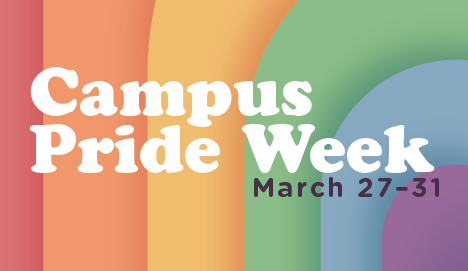
Campus Pride Week at the UNT Libraries
Events for Campus Pride Week at the UNT Libraries Monday, March 27 Tabling in the Willis Library Lobby 11am-1pm, Willis Library Lobby We’re kicking off Pride Week with swag and information about the Libraries LGBTQ+ offerings so stop by Willis on Monday between 11am and 1pm for more information #QueerYourCampus Tuesday, March 28 Queers and Allies Zine Making 2pm-4pm, Willis Room 250H Join us for a Queers & Allies Zine Making workshop on Wednesday from 2pm to 4pm. We provide all the basic supplies and instruction for you to walk away with your own mini-zine Wednesday, March 29 Film Screening: “But I’m a Cheerleader” 12PM-1:30PM, Media Library Queer it Yourself! Button Making @ the Spark 2pm- 4pm, The Spark at Willis Library Join us for Queer it Yourself! Button Making Wednesday from 2pm to 4pm at the Spark Makerspace. Show off your unique identity with your own button! LGBTQ+ Bingo 6pm-7pm, Willis Room 250H + Online Join us for LGBTQ+ Bingo on Wednesday at 6pm in person or online. Happy Pride Week! Thursday, March 30 Pride Storytime @ Sycamore 4pm-5pm, Sycamore Library Join us for Pride Storytime at Sycamore on Thursday at 4pm featuring readings of LGBTQ+ children’s books, juice & cookies. Pull up some carpet and nourish your inner child public_services_in_the_news
Posted:
02/24/2023
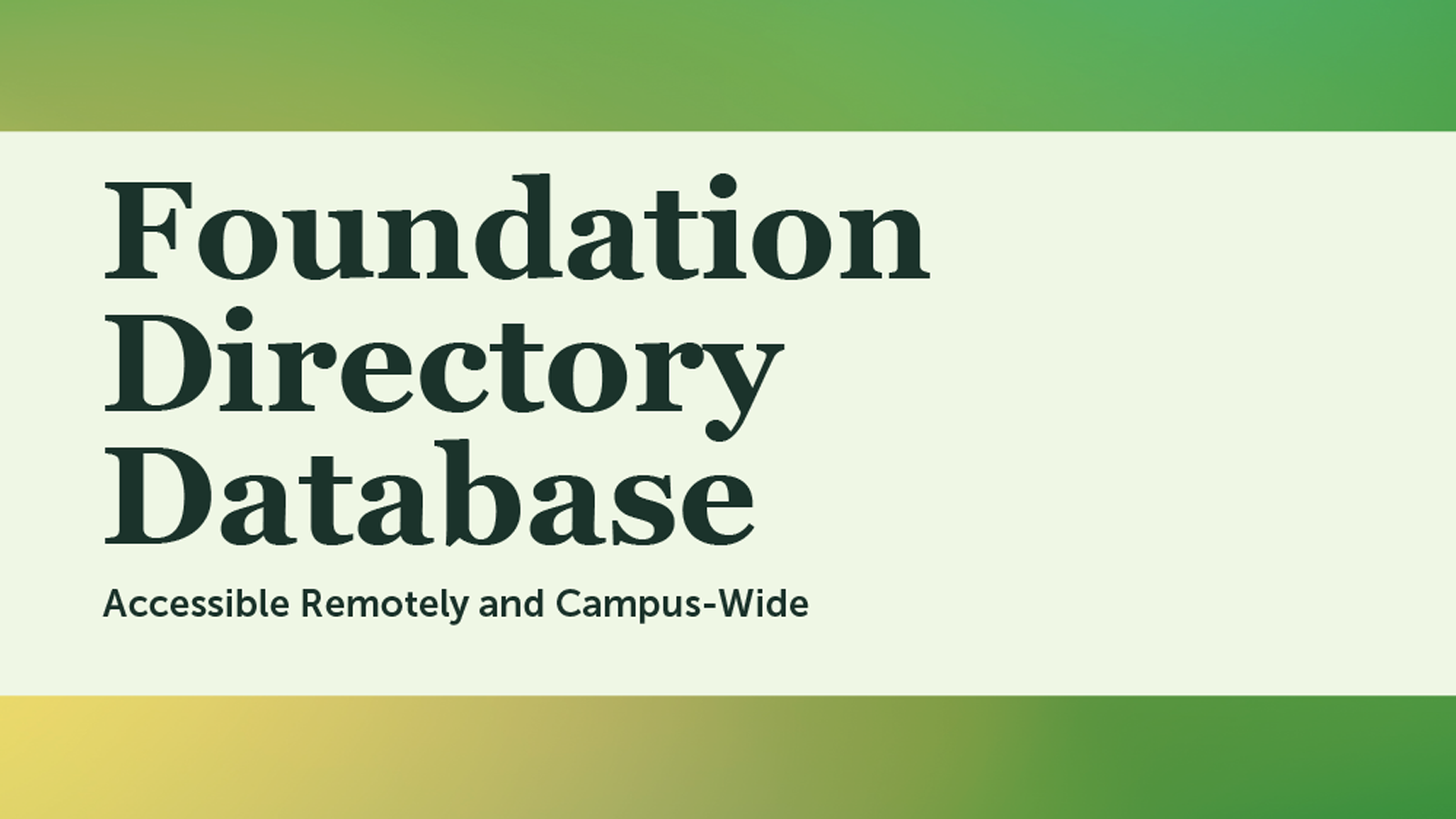
You Can Now Use The Foundation Directory Database From Anywhere
The nonprofit grants database, Foundation Directory, is now accessible anywhere on campus and remotely via the VPN for UNT community members. The nonprofit grants database, Foundation Directory, is now accessible anywhere on campus and remotely via the VPN for UNT community members. Foundation Directory is a database of nonprofit and charitable organizations that provide philanthropic funding. The database was previously only accessible on the computers in Sycamore Library. More details about the database can be found in the UNT Libraries grants guide. collection_development_in_the_news_resource_highlight_eresources
Posted:
02/22/2023

Registration for the UNT Summer Archives Institute 2023 is Now Open
The Summer Archive Institute is an experiential learning opportunity designed to immerse students in hands-on archival work, providing valuable experience and training in professional archival practice within the UNT Special Collections department. Each student will receive training to arrange and describe a unique archival collection. Additionally, each week a Special Collections staff member will lead a discussion about an area of archival practice to provide students opportunities to learn about all aspects of archival work such as preservation, digitization, public service, and instruction. At the conclusion of the Institute students will be asked to give a 3-5 minute “lightning” talk as part of a public presentation. The Summer Archive Institute is an experiential learning opportunity designed to immerse students in hands-on archival work, providing valuable experience and training in professional archival practice within the UNT Special Collections department. Each student will receive training to arrange and describe a unique archival collection. Additionally, each week a Special Collections staff member will lead a discussion about an area of archival practice to provide students opportunities to learn about all aspects of archival work such as preservation, digitization, public service, and instruction. At the conclusion of the Institute students will be asked to give a 3-5 minute “lightning” talk as part of a public presentation. The Summer Archives Institute will take place on the UNT-Denton campus. Students will work primarily in Willis Library, with some activities taking place at the Library Annex and Research Collections Library, also located in Denton. Students will be supervised by Librarians in the Special Collections department. May 22 – June 23, 2023 9am-3pm (one hour lunch), 5 hours per day, 125 hours total Willis Library - Room 443 What students will gain: Hands-on experience working with an archival collection Opportunity to meet archivists and librarians and explore the different aspects of Special Collections work Training in archival processing, arrangement, and description At the completion of the practicum students will have work products such as processing plans and finding aids suitable for inclusion in an e-portfolio Experience presenting their work as part of a “lightning session” Students must enroll in the COI Practicum summer section to participate in this institute. Requirements for consideration: Current graduate student at UNT Completion of INFO 5371 – Archives and Manuscripts, or comparable introductory archival coursework Excellent writing skills—including the ability to analyze content, compose concise descriptions, and proofread Thorough understanding of English grammar and spelling Facility with visual details Ability to pay close attention to detail To be considered for the Archives Institute students will need to submit: Application Form A one-page cover letter describing their interest in the Archives Institute Resume or CV Four to six graduate students will be selected to participate in this year’s Summer Archives Institute. Applications must be submitted by midnight on Monday, April 3rd. Applicants will be notified of their acceptance no later than April 10, 2023. Participant Stipend We intend to provide a $500 stipend to students who complete the Summer Archives Institute and a certificate of completion. For more information and to obtain the application form, please contact Jodi Rhinehart-Doty in UNT Special Collections. special_collections_in_the_news
Posted:
02/14/2023
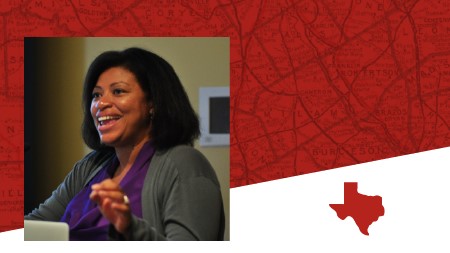
Texas Edges Lecture Series: Tyina Steptoe
This year’s speaker for the Texas Edges Lecture Series will be Dr. Tyina Steptoe, author of the award-winning Houston Bound: Culture and Color in a Jim Crow City. This year’s speaker for the Texas Edges Lecture Series will be Dr. Tyina Steptoe, author of the award-winning Houston Bound: Culture and Color in a Jim Crow City. The lecture will take place February 22, 2023 at 2:00 pm in GAB 105. Dr. Steptoe will deliver her lecture on “The Sound of Race and Gender in 20th-Century Texas,” where she will discuss Peacock Records (the label founded by Don Robey in Houston in 1949) as a fascinating window into how sound can serve as a source for writing about histories of race, gender, and sexuality. Biography Tyina Steptoe is an associate professor of history at the University of Arizona. Her research and teaching focus on race, gender, and culture in the United States. Her book, Houston Bound: Culture and Color in a Jim Crow City, won several awards, including honors from the Urban History Association and the Western History Association. She is currently working on a book that explores the history of gender and sexuality in rhythm and blues music produced in the U.S. West. She also produces and hosts Soul Stories, a program that explores the history of R&B music, on KXCI Tucson community radio. Links Personal Website digital_libraries_presentations_and_lectures
Posted:
02/09/2023